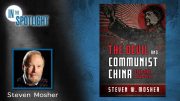
Brad Meltzer and Josh Mensch, The First Conspiracy — The Secret Plot to Kill George Washington, (New York: Flatiron Books, 2019) 413 pages. Hardcover. $29.99
The story that Meltzer and Mensch present in The First Conspiracy — The Secret Plot to Kill George Washington is so unexpected that it leaves the reader wondering, “How have I never heard about this before?” As Meltzer observes at the beginning of the book: “Naturally, I started with skepticism. Was this true, or just some overhyped myth? … A bit of digging found small mentions in many scholarly works. Some called it a plot to kill George Washington; others said the goal was to seize or kidnap him, but I couldn’t find an entire book written on the subject.” That gap in the bookshelf has now been filled with a masterful account of a British conspiracy that almost stopped the American Revolution before it could begin.
Given the character of the way in which the authors set forth the events described in The First Conspiracy, a reviewer feels compelled to issue a “spoiler alert” before beginning to recount any details. The authors certainly have a flare for the dramatic and the way in which they set forth the course of the conspiracy ties in much of the early history of the revolution. In truth, the book provides a useful primer for anyone who, as a victim of public education, thinks the revolution began with the Declaration of Independence. Meltzer and Mensch do an excellent job of setting forth some of the intricacies of the political and military maneuvers that took place in the months and years leading up to July of 1776.
The conspiracy is all the more alarming because it involved the subversion of soldiers from the innermost circle of the defense of George Washington: the general’s “Life Guards.” Again, the authors heighten the sense of the drama by emphasizing the role of General Washington as one of the revolution’s “indispensable men” — but that characterization is an accurate one. As is established early in The First Conspiracy, the genesis of the plot rests with the British governor of New York, William Tryon. Meltzer and Mensch establish the ruthless character of Governor Tryon when recounting his prior role as governor of North Carolina, during which time he brutally suppressed the farmers who protested his exorbitant taxes. Rather than negotiating with the protesters, Tryon used mercenaries to slaughter many of them in the so-called Battle of Alamance, and then sentenced the leaders to death by being drawn and quartered. Tryon used brutality when he deemed that to be effective, and subversion when subtler arts were required.
If Tryon learned anything from his time governing North Carolina, it’s that showing clear strength is the best way to win over a population. In North Carolina, it was pretty straightforward: When there was a rebellion of poor farmers — the so-called Regulators — he crushed it by force and hanged the leaders. Everyone fell quickly into line after that.
But in New York, it wouldn’t be so easy. Many of the rebels were from prominent families and had important connections. Unlike the dirt-poor farmers of North Carolina, Tryon couldn’t just slaughter them. As the governor himself put it to the English Parliament, “It would not do to treat New Yorkers as I did the Regulators; they are a very different kind of men.”
The authors also go into detail with regard to the development of counterintelligence efforts within the government of the Continental Congress. The establishment of a “Secret Committee” within the Congress charged with countering British conspiracies gives a sense of the way in which such institutions quickly develop in times of war.
The First Conspiracy is a book well-suited for any reader with an interest in the course of the American Revolution. While those individuals who are knowledgable of more than the most basic outline of the history may find that at times the authors are plowing very familiar fields, nevertheless their abilities as storytellers make even the recitation of familiar details quite captivating. The First Conspiracy makes a worthy alternative to the novels that often make up much of the “beach reading” market: It is a work of serious history that is told in an engaging way, and it serves as a reminder that conspiracies targeting the foundations of the American Republic are nothing new.



